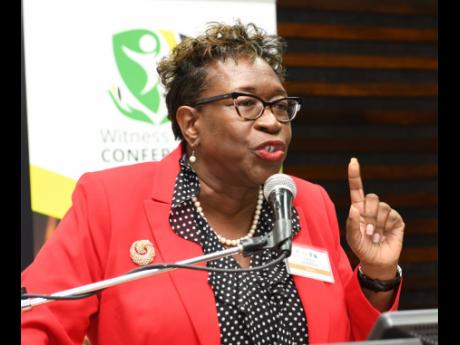DPP bemoans lack of enthusiasm to serve as jurors
WESTERN BUREAU:
Paula Llewellyn, the country’s chief prosecutor, wants the Ministry of Justice to exert the same amount of energy that is being used in its human trafficking and HIV public education campaigns in getting Jamaicans to serve the justice system as jurors.
The director of public prosecutions’ (DPP) comments come against the background of the reluctance of many Jamaicans to serve as jurors. It was reported that out of the 400 summonses that were prepared by the St James Police Division for persons to serve as jurors in the ongoing Michaelmas sitting of the St James Circuit Court, only 31 were served, and of that number, only 13 showed up to serve.
“Although we have a system where the defendant can elect to be tried by a judge alone, 90 per cent of the time they are going to want the jury,” said Llewellyn. “I think the Government, perhaps the Ministry of Justice, needs to increase public education and connect the dots for people so that they can better understand what happens in the [justice] system.”
Llewellyn said that part of the problem that the justice system faces in getting persons to serve as jurors has to do with the concept of personal responsibility and how committed one is to one’s country.
“I have a pet peeve,” declared Llewellyn. “It has to do with the concept of personal responsibility and what it means to be a citizen … . We need to find a way (to teach it) in the classroom, from basic school … a modified version of civics, but some module that is going to impart from they are three, four years old, the importance of what it means to be a citizen and the concept of personal responsibility.”
According to Llewellyn, part of the problem is that many persons declare that they are afraid to serve. “They can’t tell you what they are afraid of. They are afraid of a perception, and it is not until they or a member of their family gets into trouble, then they want to go to court and cannot understand why the matter is taking so long,” said Llewellyn, who noted that those who have served are in awe of how much they have learned during the process.
Llewellyn also stated that the way the media report court cases also contributed to the lack of enthusiasm among those who are reluctant to serve.
“Sometimes, unwittingly, within the media fraternity, in terms of what you put out there, it’s so negative that it has a way of sapping any positive enthusiasm that people may have, especially if you are in an environment where every day you hear about crime,” said Llewellyn.

